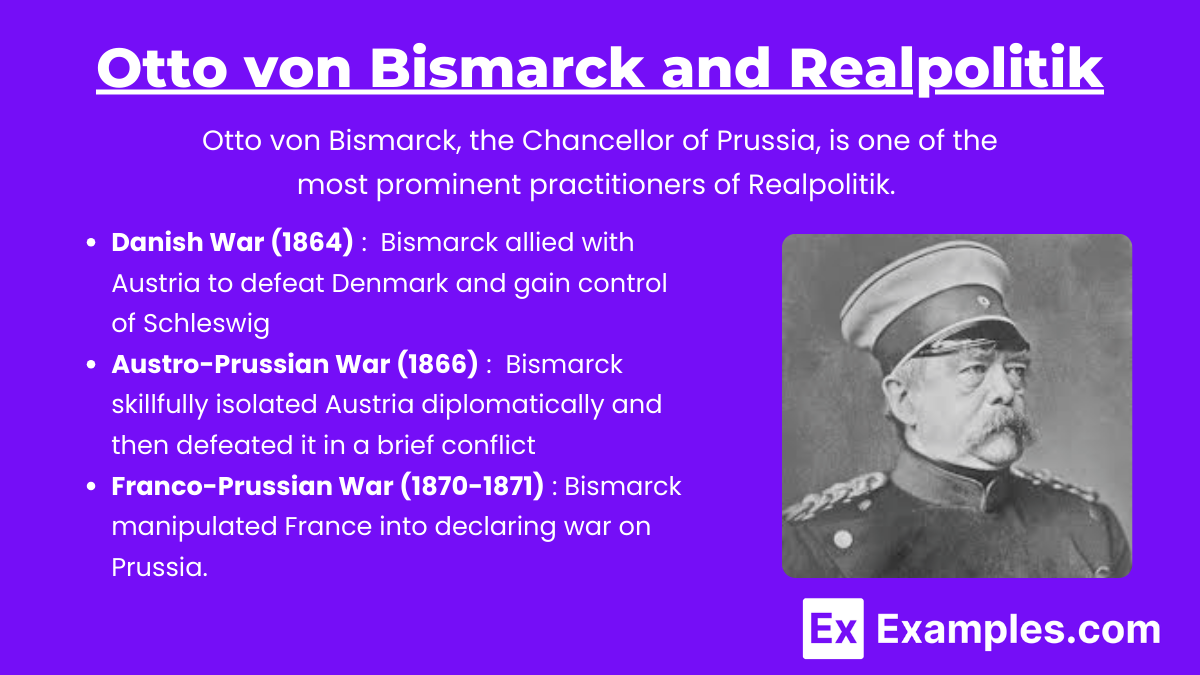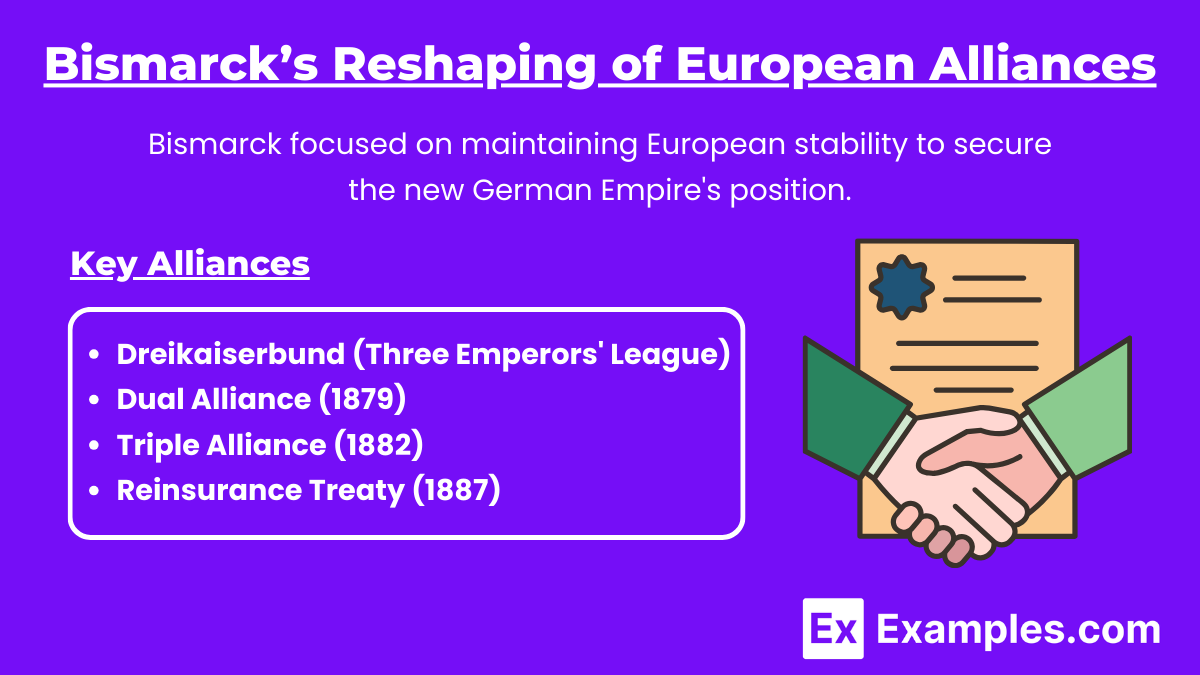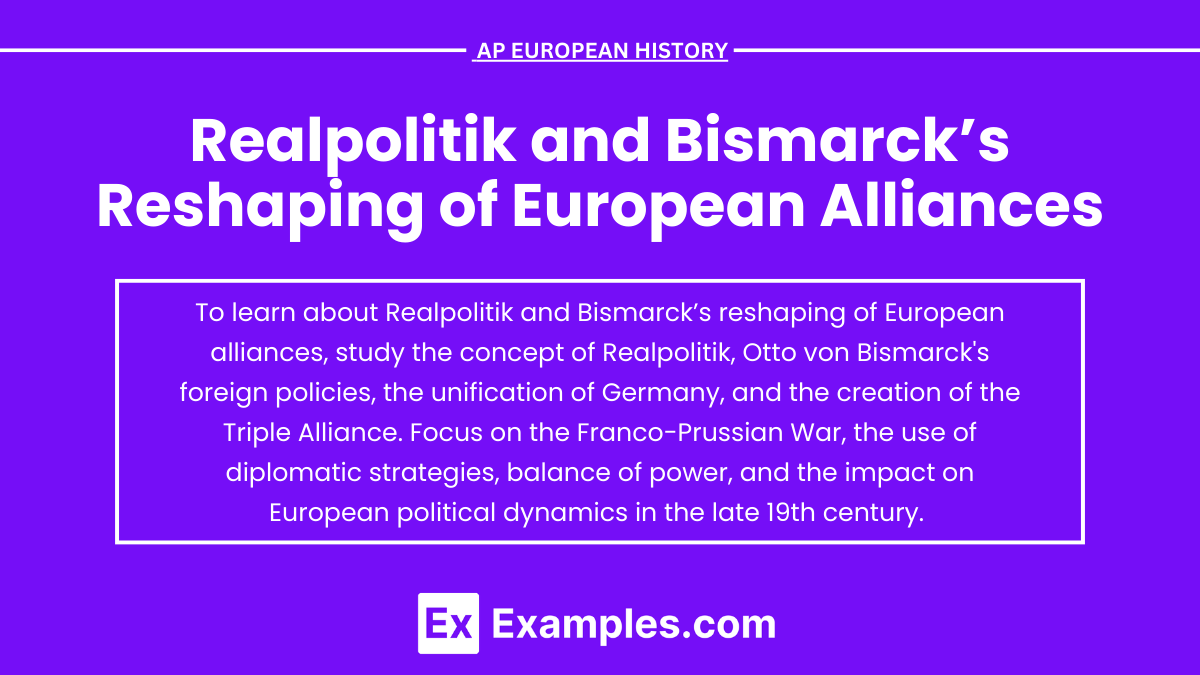Realpolitik, a pragmatic and practical approach to politics, prioritizes national interest and power over ideology and ethics. In AP European History, Otto von Bismarck, the Prussian Chancellor, masterfully employed Realpolitik to unify Germany and establish it as a dominant European power. Through strategic wars and alliances, Bismarck reshaped European alliances, ensuring stability and preventing large-scale conflicts. His diplomatic maneuvers, aimed at isolating France and balancing power, created a lasting impact on European politics in the late 19th century.
Learning Objectives
By studying "Realpolitik and Bismarck’s Reshaping of European Alliances," you should learn how Bismarck’s pragmatic political strategy led to the unification of Germany and the creation of a stable European balance of power. Understand the key wars and alliances orchestrated by Bismarck, such as the Danish War, Austro-Prussian War, Franco-Prussian War, and the formation of the Triple Alliance. Recognize the significance of Realpolitik in shaping modern European diplomacy and its impact on the geopolitical landscape of the late 19th century.
Realpolitik

Realpolitik is a term derived from the German words "real" (meaning "realistic" or "practical") and "politik" (meaning "politics"). It refers to a pragmatic, no-nonsense approach to politics, where decisions are made based on practical considerations and the realities of power rather than ideological or ethical premises. This political philosophy emphasizes the pursuit of national interest and power over principles or moralistic concerns.
Key Features of Realpolitik
Pragmatism: Decisions are guided by practical concerns and outcomes.
National Interest: The primary goal is to enhance the power and security of the state.
Power Politics: Realpolitik involves strategic maneuvering to balance power and avoid conflicts.
Flexibility: Leaders using Realpolitik adapt to changing circumstances and opportunities.
Otto von Bismarck and Realpolitik

Otto von Bismarck, the Chancellor of Prussia, is one of the most prominent practitioners of Realpolitik. Bismarck utilized Realpolitik to unify Germany and to maintain its position in European politics through a series of calculated alliances and conflicts.
Bismarck’s Early Career and Unification of Germany
Bismarck became the Chancellor of Prussia in 1862. His main goal was to unify the German states under Prussian leadership, which he achieved through a series of wars and diplomatic maneuvers:
Danish War (1864): Bismarck allied with Austria to defeat Denmark and gain control of Schleswig and Holstein.
Austro-Prussian War (1866): Bismarck skillfully isolated Austria diplomatically and then defeated it in a brief conflict, leading to the creation of the North German Confederation.
Franco-Prussian War (1870-1871): Bismarck manipulated France into declaring war on Prussia. The subsequent victory united the southern German states with the North German Confederation, resulting in the proclamation of the German Empire in 1871.
Bismarck’s Reshaping of European Alliances

Following the unification of Germany, Bismarck focused on maintaining European stability to secure the new German Empire's position. He pursued a complex system of alliances designed to prevent any single power from becoming too dominant and to isolate France, which sought revenge for its defeat in the Franco-Prussian War.
Key Alliances and Diplomatic Strategies
Dreikaiserbund (Three Emperors' League): An alliance between Germany, Austria-Hungary, and Russia established in 1873 to maintain conservative order and prevent conflict among them.
Dual Alliance (1879): A defensive alliance between Germany and Austria-Hungary aimed at countering Russian influence in the Balkans.
Triple Alliance (1882): Italy joined the Dual Alliance, forming the Triple Alliance with Germany and Austria-Hungary to further isolate France and counterbalance the Triple Entente of France, Russia, and Britain.
Reinsurance Treaty (1887): A secret agreement between Germany and Russia ensuring neutrality if either were attacked by a third party, aiming to keep Russia from allying with France.
Otto von Bismarck's use of Realpolitik and his reshaping of European alliances were pivotal in the unification of Germany and the stabilization of Europe during the late 19th century. His pragmatic approach to politics, emphasis on power dynamics, and strategic use of alliances demonstrated the effectiveness of Realpolitik in achieving national goals. However, the delicate balance he created was also a precursor to the complex web of alliances that ultimately contributed to the outbreak of World War I. Understanding Bismarck’s strategies and their outcomes is crucial for mastering AP European History and gaining insights into the intricate nature of 19th-century European politics.
Examples
Example 1
Austro-Prussian War (1866)
Context and Strategy: Bismarck sought to assert Prussian dominance over German states by provoking Austria into a conflict. He strategically isolated Austria diplomatically and used military force effectively.
Outcome: Prussia's victory led to the Treaty of Prague, which excluded Austria from German affairs and resulted in the creation of the North German Confederation under Prussian leadership.
Example 2
Franco-Prussian War (1870-1871)
Context and Strategy: Bismarck aimed to unify the German states under Prussian control by inciting nationalist fervor against a common enemy. He manipulated the Ems Dispatch to provoke France into declaring war.
Outcome: The decisive Prussian victory and the Treaty of Frankfurt led to the unification of Germany and the proclamation of the German Empire in 1871, with King Wilhelm I of Prussia as Emperor.
Example 3
Three Emperors' League (1873)
Context and Strategy: To prevent isolation and maintain stability, Bismarck formed an alliance with Austria-Hungary and Russia, promoting mutual interests and peace in Eastern Europe.
Outcome: The League initially reduced the likelihood of conflict among the three powers and isolated France diplomatically, though it eventually collapsed due to conflicting interests between Austria-Hungary and Russia.
Example 4
Dual Alliance (1879)
Context and Strategy: Facing increased Russian hostility, Bismarck secured a defensive alliance with Austria-Hungary to counterbalance Russian power and protect German interests.
Outcome: This alliance ensured mutual support in the event of Russian aggression, solidifying Germany's position in Central Europe and deterring Russian advances.
Example 5
Reinsurance Treaty (1887)
Context and Strategy: After the collapse of the Three Emperors' League, Bismarck aimed to prevent a Franco-Russian alliance by securing a secret neutrality pact with Russia.
Outcome: The Reinsurance Treaty guaranteed that Germany and Russia would remain neutral if either was attacked by a third party, helping to maintain peace and isolate France diplomatically until its eventual lapse in 1890.
Multiple Choice Questions
Question 1: What was the primary objective of Otto von Bismarck’s Realpolitik?
A) To promote democratic principles across Europe
B) To expand Prussian territory through military conquest
C) To strengthen the position of Prussia through practical and pragmatic alliances
D) To establish a unified European government
Answer: C) To strengthen the position of Prussia through practical and pragmatic alliances
Explanation: Otto von Bismarck’s Realpolitik focused on practical and pragmatic policies to strengthen the position of Prussia and later the German Empire. Bismarck avoided ideological principles, instead opting for flexible diplomacy and alliances to maintain balance and prevent conflicts that could threaten Prussia’s dominance. His strategies included forming and dissolving alliances based on political needs rather than ideological alignments.
Question 2: Which of the following alliances was a direct result of Bismarck’s diplomatic efforts?
A) The Triple Entente
B) The League of Nations
C) The Holy Alliance
D) The Triple Alliance
Answer: D) The Triple Alliance
Explanation: The Triple Alliance, formed in 1882, was a result of Bismarck’s Realpolitik. It included Germany, Austria-Hungary, and Italy. Bismarck engineered this alliance to isolate France and secure Germany’s position in Europe by creating a bloc of allied powers. This alliance was a defensive pact, ensuring mutual support in case of an attack by France or other powers, thereby maintaining the balance of power that Bismarck sought to achieve.
Question 3: How did Bismarck's approach to European diplomacy change after the unification of Germany in 1871?
A) He focused on aggressive military expansion to dominate Europe.
B) He sought to maintain peace through a network of alliances and treaties.
C) He promoted socialist policies to stabilize the newly unified Germany.
D) He withdrew Germany from international affairs to focus on domestic issues.
Answer: B) He sought to maintain peace through a network of alliances and treaties.
Explanation: After the unification of Germany in 1871, Bismarck shifted his focus to maintaining peace in Europe to protect the newly formed German Empire. He recognized that further military conflicts could destabilize Germany. Thus, he implemented a complex system of alliances and treaties designed to prevent the outbreak of war and keep France diplomatically isolated. His diplomatic efforts aimed at preserving the status quo and ensuring that Germany remained a dominant but non-aggressive power in Europe.


